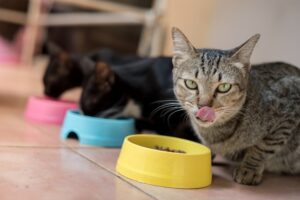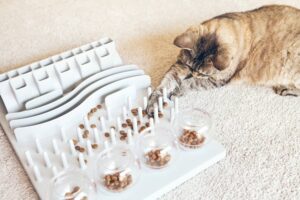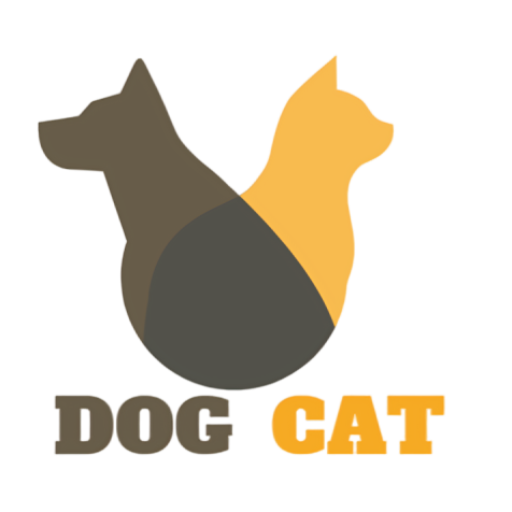Does your cat eat so fast that their food is gone in just a few minutes? Perhaps even your cat eats too fast and throws up? If so, you might be wondering if this is OK or whether you should try to slow your cat down at mealtimes. Bolting food can lead to vomiting and other digestive issues, so helping them to slow down and savor their meals is recommended.
Read on to find out why some cats eat so fast, what kind of problems eating too quickly can cause for cats, and how to slow your cat down so they don’t eat their food too fast.
Reasons Why Cats Eat Too Fast
Eating food too fast, also called bolting food, can sometimes be the result of a physical issue, for instance, if a cat is abnormally hungry. More often, however, it’s usually a behavioral issue.
“Cats may bolt their food quickly due to instinctual behavior inherited from their wild ancestors, who had to eat rapidly to avoid predators or competitors” said Amanda J. Campion, a clinical animal behaviorist in the United Kingdom.
Some common reasons cats eat too fast include:
- Competition for food: If your cat lives with other pets, they might be bolting food because they fear they won’t get enough to eat. This is common in households where one or more pets steal, or block access to, another pet’s food, or if multiple cats are fed communally out of one bowl. This can be an instinctual or a learned behavior.
- Emotional eating: Cats sometimes eat too much too quickly due to boredom or being understimulated, or if they are experiencing stress and anxiety. Eating food this way is a form of comfort eating.
- Tasty food: If your cat’s food is exceptionally yummy, or if you sometimes feed a special, very palatable food as a treat, your cat might be eating it too fast simply because it tastes so good.
- Excessive hunger: Cats might gulp their food too fast if they aren’t getting enough to eat; if they are suffering from a medical problem that causes excessive hunger such as hyperthyroidism, diabetes, Cushing’s disease, or intestinal parasites; or if they are taking medication that causes them to be extra hungry as a side effect.
Problems When a Cat Eats Too Fast

According to Campion, eating too fast can be problematic for cats as it may lead to digestive issues or more serious conditions. Some common problems that occur when cats eat too fast include:
1. Regurgitation and Vomiting
If your cat throws up or regurgitates immediately after eating, they might be eating too fast. When cats eat too fast, they often eat more than their stomach is comfortable holding. Cats also swallow a lot of air when they gulp their food quickly, which can add to the discomfort. Regurgitation in cats happens soon after eating, and usually includes a large volume of undigested food along with some clear liquid. Vomiting often happens a little while after eating, and is accompanied by gagging and forceful abdominal contractions.
2. Choking and Gagging
When cats eat too fast, they don’t spend enough time chewing and swallowing the food. This can cause them to choke on food, which might be followed by gagging or vomiting.
3. Digestive Issues
When cats eat too fast, they can become bloated due to too much food and air accumulating in the stomach, which can lead to stomach discomfort and gas. Cats also might not digest their food adequately because they aren’t chewing the food properly, exposing the food to digestive enzymes which break it down into useable nutrients. Poor absorption can lead to a lack of essential nutrients and even weight loss.
4. Overeating and Obesity
Cats that eat too fast often overeat, since they don’t notice when they are full. When cats habitually overeat, they might become obese and develop associated medical conditions, such as diabetes, heart disease, and arthritis.
5. Behavioral Problems
Cats that routinely eat too fast can develop serious behavioral issues related to their eating habits. Cats that eat fast because they have anxiety about not getting enough food can acquire food guarding behavior or even aggression around the food bowl aimed at other pets or people who walk by. They may also attention-seek to varying degrees around meal times.
Ways To Slow Cats Down When Eating

If you notice that your cat eats too fast, especially if your cat eats too fast and throws up, it’s important to take steps to slow them down so they don’t develop any of the health or behavioral issues related to bolting food.
Campion recommends always feeding your cats separately no matter how bonded they are. This will prevent one cat from stealing another’s food, and can also keep cats from becoming worried or anxious that a cat might infringe on their mealtime.
Some other tips to slow your cat down at mealtimes include:
- Feed multiple small meals per day: Rather than feeding twice a day, split your cat’s daily portion into three or four smaller portions to prevent them from eating too much at once and to reduce anxiety about when the next meal is coming. Automatic feeders can help if you’re not home enough to feed multiple meals.
- Skip the bowl: Spread the food out on a flat tray or baking sheet, which forces your cat to take smaller and slower mouthfuls and can slow them down.
- Try a slow feeder cat bowl: These specially designed bowls have obstacles inside that make it harder for cats to gulp food.
- Use a puzzle feeder: These ingenious products require your cat to use their brains and paws to manipulate them to get the food. This slows down their eating but also provides mental stimulation. Some can even be used with wet food.
- Feed from a treat-dispensing toy: If your cat eats dry food, you can feed them from one of these round or oblong toys that have holes that spill out pieces of food when the cat bats it around. Although designed for use with treats, you can fill them with your cat’s dry kibble meals.

